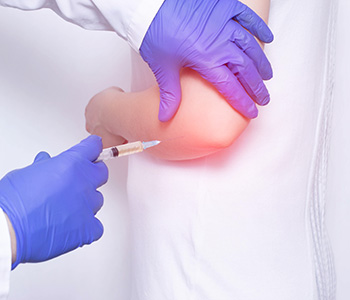Rheumatoid Arthritis
Advanced treatment for rheumatoid arthritis in Encinitas CA
Seaside Rheumatology and Wellness Center is known for providing quality care and advanced therapies in Encinitas, CA. We treat all types of rheumatological conditions, including rheumatoid arthritis (RA). Rheumatoid arthritis is an inflammatory condition affecting the synovium, which is a connective membrane in joints. It serves several functions, the most important being production of synovial fluid, which is the lubricant that keeps joints moving freely.
In people affected by rheumatoid arthritis, the synovium inflammation causes proliferation and abnormal fibrous tissue growth. Over time, the abnormal fibrous tissue can invade ligaments, cartilage, and bone tissue around joints. It causes swelling and pain, with eventual degradation and deformity of the impacted joint.
Causative factors
The exact cause of rheumatoid arthritis is still unknown, but researchers believe that some people may be genetically predisposed to rheumatoid arthritis, which is then triggered by environmental conditions. Rheumatoid arthritis is thought to activate the adaptive immune system, which actually perpetuates the condition, while the innate immune system is exerting a persistent adjuvant effect.
Rheumatoid factor (RF) and other antibodies are commonly present in blood of rheumatoid arthritis patients. They may be detected years before the development of rheumatoid arthritis.
Environmental factors may trigger the onset of rheumatoid arthritis or exacerbate symptoms. These factors include:
- Changes in oral, digestive, or respiratory microbiomes
- Exposure to silica
- Nicotine use
- Parvovirus B19, Epstein-Barr, and certain other viruses
Risk factors for rheumatoid arthritis
- Ethnicity – This is not a risk factor
- Gender – Women are three times more likely to get rheumatoid arthritis than men are
- Age – Symptoms can develop at any age, but most often begin between the ages of 40 and 60
Progression of symptoms
Rheumatoid arthritis can range from debilitating to mild symptoms, depending on the patient and the progression of the condition. In more than half of patients, the symptoms develop slowly and insidiously, over a period of weeks or months. In 20 percent of patients, the onset is subacute (somewhat rapid) onset, and about 10 percent have acute (very sudden) aggressive onset.
In most patients, smaller joints are affected before larger ones are. Commonly affected joints include:
- Hands and feet – Metatarsophalangeal, proximal interphalangeal, metacarpophalangeal, and wrists
- Spine – Especially C1 and C2 vertebra in the neck
- Other joints in the body
Some patients develop extra-articular (not involving joints) symptoms. This is more common in males who are HLA-DR4 positive and RF positive. Extra-articular symptoms may include:
- Rashes or nodules below the skin
- Pericarditis or myocarditis (types of heart related inflammation)
- Neuropathy (nerve dysfunction, often affecting hands or feet)
- Ocular inflammation
- Lymphoma (a cancer of the blood)
- Felty’s syndrome (a condition characterized by low white blood cell count, rheumatoid arthritis, and enlargement of the spleen)
- Interstitial lung disease (a progressive lung condition)
- Sjogren’s syndrome (affects mucous membranes)
- Amyloidosis (accumulation of harmful proteins in organs)
- Atherosclerosis (buildup of plaque in the arteries)
Treatment options for rheumatoid arthritis at Seaside Rheumatology and Wellness Center - Dr. Lloyd

What is Rheumatoid arthritis?
Rheumatoid arthritis is an inflammatory arthritis that can lead to significant joint deformity if left untreated.
Rheumatoid arthritis can affect any age group. It can happen in young children, middle-aged, or even elderly adults.
How is rheumatoid arthritis diagnosed?
Rheumatoid arthritis is diagnosed based on clinical symptoms, lab tests, and various imaging modalities such as X-rays and MRIs.
The treatment goal for rheumatoid arthritis is to reduce inflammation enough to the point that the disease is in remission.
There’s no cure for rheumatoid arthritis, so patients will require maintenance therapy for many years.
What are the medications available for rheumatoid arthritis?
There are several types of medication. Treatment for rheumatoid arthritis is initially combined with natural supplements and medicines known as disease-modifying antirheumatic medications.
This combination provides a significant benefit to most patients. However, many patients will continue to have active disease despite these medications.
Therefore, patients with persistent disease, despite the more traditional treatment methods, will require a newer medication known as biologic therapies.
These medications are, for the most part, injectable medications. Some of the newer ones on the market are oral medications.
But the overall goal of these medications is similar to the traditional disease-modifying antirheumatic medications.
In that, they are modulating or suppressing the immune system to reduce inflammation in this disease and prevent joint damage.
Feel free to give us a call today to learn more about how we can help treat rheumatoid arthritis.
How rheumatoid arthritis is treated
Researchers have made significant progress identifying the genetic and immunologic factors of rheumatoid arthritis, as well as clarifying the epidemiological and clinical features of the condition. Even more important, the medical community has made great strides in developing biologic and systemic treatment options.
Traditional therapies include:
- NSAIDS – Over the counter or prescription medications such as indomethacin, diclofenac, naproxen, or ibuprofen, can provide fast and temporary pain relief and reduction of inflammation. However, they only address symptoms. They do not slow the progression of the condition.
- DMARDs – cyclosporine, minocycline, azathioprine, methotrexate, hydroxychloroquine, sulfasalazine, leflunomide, and cyclosporine can slow or halt development of the condition and help prevent joint damage. However, it can take months for these medications to fully take effect.
- Steroids – These fast-acting treatments can significantly improve swelling and pain, usually within 24 hours. However, they are not recommended for long-term use due to side effects.
- Biologics – This group of medications includes infliximab (Remicade®), certolizumab (Cimzia®), golimumab (Simponi®), adalimumab (Humira), and etanercept (Enbrel®), which are tumor necrosis factor-alpha blockers. It also includes tocilizumab (Actemra ®), rituximab (Rituxan®), anakinra (Kineret®), and abatacept (Orencia®), which are non-TNF inhibitors. These medicines are administered intravenously or via injections, and they work to slow or stop rheumatoid arthritis.
- Other – The oral medication tofacitinib (Xeljanz®), which is a JAK kinase inhibitor, may be used in some cases.
Integrative rheumatoid arthritis therapies include supplemental nutrition and dietary changes. This is often a highly successful approach, when supervised by a skilled rheumatologist such as Dr. Lloyd. This may include:
- Elimination diets
- Supplemental omega-3 polyunsaturated fatty acids
- Prebiotics and probiotics
- Sea cucumber extract
- Herbal supplements such as devil’s claw, Oregon grape, black currant seed oil, Boswellia, turmeric, and yucca schidigera
It is important to seek treatment early, in order to minimize or avoid progressive joint damage. Without treatment, it can become severely painful and lead to irreversible deformities.
If you have been diagnosed with rheumatoid arthritis, or you are exhibiting any signs of the condition, please call Seaside Rheumatology and Wellness Center and schedule a consultation.








